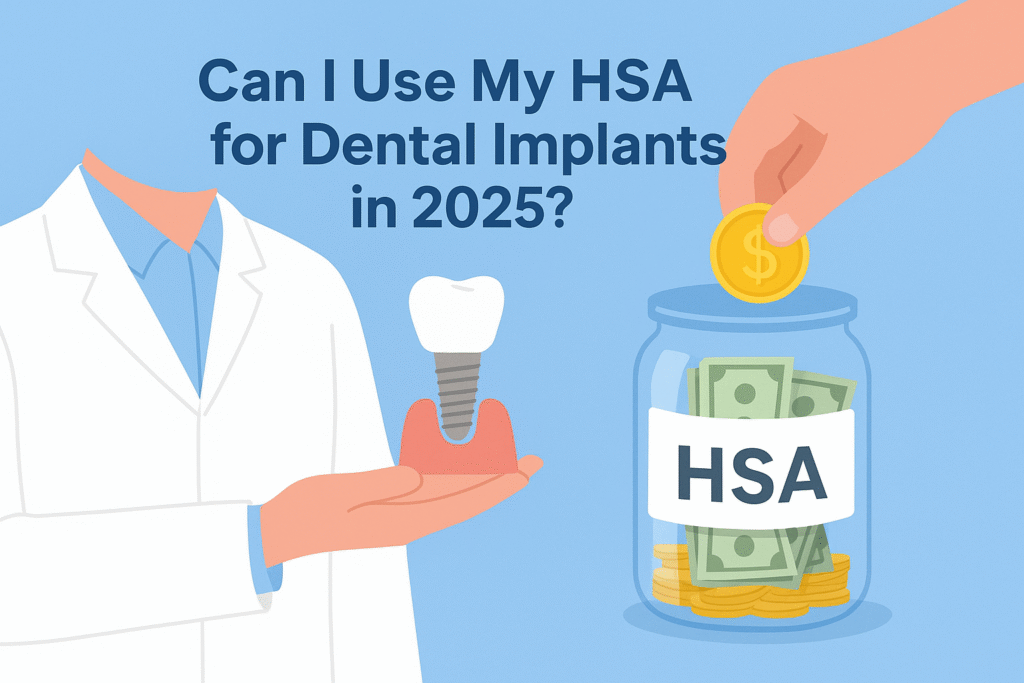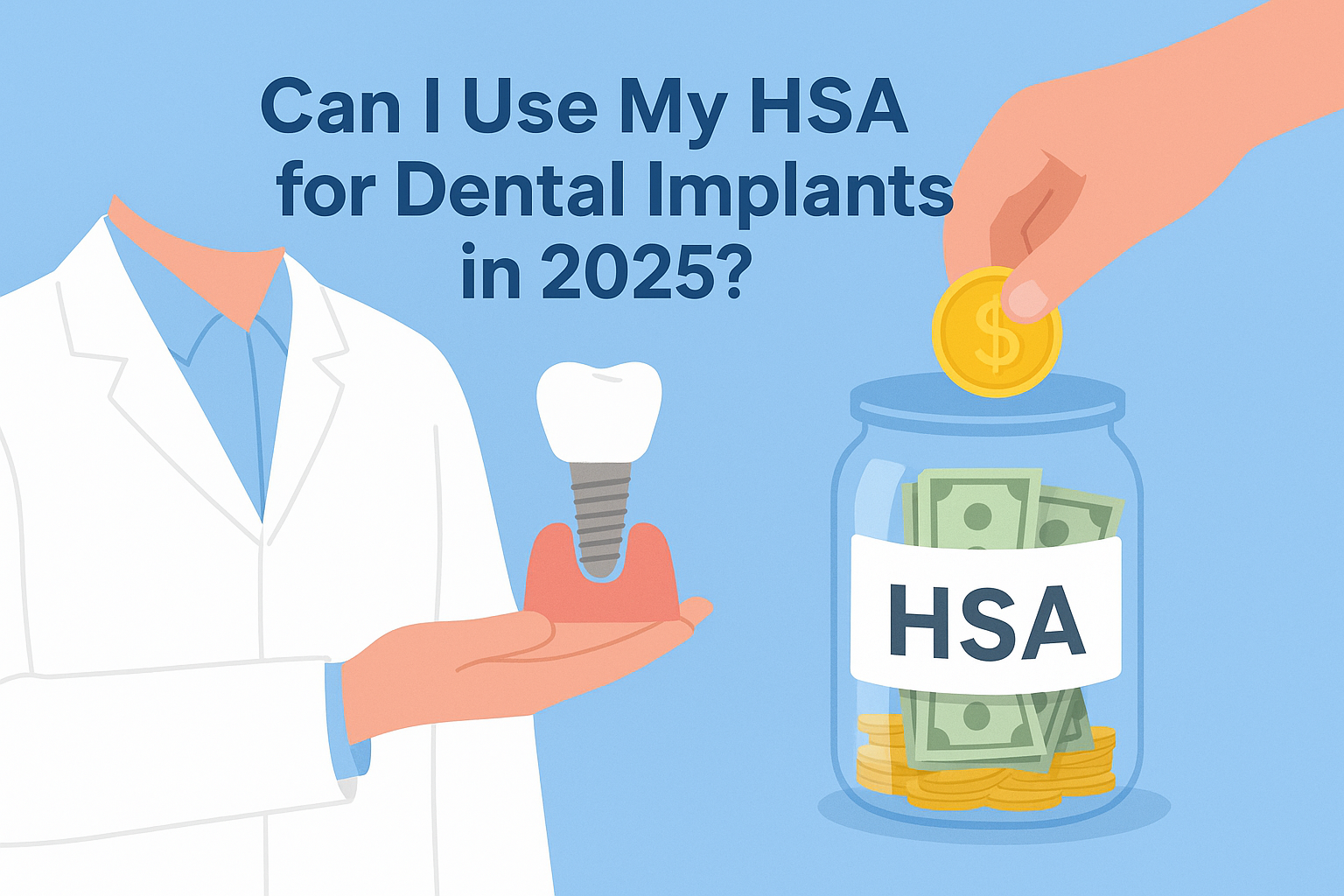
Can I use my HSA for Dental Implants? Learn IRS rules, eligibility, costs, tax savings, and smart tips to use your Health Savings Account for dental implants in the U.S.
Can I Use My HSA for Dental Implants? A Complete Guide for Americans
When it comes to maintaining oral health, dental implants have become one of the most reliable solutions for replacing missing teeth. But if you live in the United States, you already know that dental procedures can be expensive. Many Americans are now asking: “Can I use my HSA for dental implants?”
The short answer is: Yes, in most cases you can use your Health Savings Account (HSA) for dental implants — but there are important details and IRS rules you need to understand before spending your HSA funds.
In this guide, we’ll break down everything you need to know about using your HSA for dental implants, eligibility rules, tax benefits, cost savings, and tips to maximize your healthcare dollars.
What Is an HSA?
An HSA (Health Savings Account) is a tax-advantaged savings account available to individuals enrolled in a High-Deductible Health Plan (HDHP). The main purpose of an HSA is to help you save money for qualified medical expenses, including dental and vision care.
Key Benefits of an HSA:
- Tax-deductible contributions – Money you put into your HSA reduces your taxable income.
- Tax-free growth – Investments and interest earned in the account are tax-free.
- Tax-free withdrawals – When you use the money for qualified medical expenses, you don’t pay taxes.
- Rollover benefit – Unlike an FSA (Flexible Spending Account), your HSA funds roll over each year and remain available.
This triple tax advantage makes HSAs one of the most powerful healthcare savings tools available in the U.S.

Are Dental Implants Covered by an HSA?
Yes, dental implants are typically considered a qualified medical expense under IRS guidelines when the procedure is medically necessary.
The IRS Publication 502 outlines which dental expenses qualify for tax-free HSA spending. It clearly states that you can use HSA funds for dental treatments that affect your oral health and overall well-being, including:
- Tooth extractions
- Dental fillings
- Crowns, bridges, and dentures
- Dental implants (if medically necessary)
When Dental Implants Qualify for HSA Use
- If you’ve lost teeth due to decay, gum disease, or injury, implants are considered a medical necessity.
- If implants are needed to restore proper chewing and speech function, they qualify.
- If the implants are required to preserve your jawbone structure and oral health, HSA funds may be used.
When Dental Implants May Not Qualify
- If implants are done purely for cosmetic purposes (e.g., improving smile appearance without medical need), they may not be covered.
- Procedures such as teeth whitening or purely aesthetic veneers are not eligible for HSA use.

How Much Do Dental Implants Cost in the U.S.?
Dental implants are a significant investment. On average, Americans pay:
- Single tooth implant: $3,000 – $6,000
- Multiple implants: $10,000 – $30,000
- Full mouth reconstruction with implants: $25,000 – $60,000 or more
The cost varies depending on:
- Location (urban vs. rural states)
- Dentist’s expertise
- Materials used (titanium vs. zirconia implants)
- Whether additional procedures are needed (bone graft, sinus lift)
This is where HSA funds become incredibly useful — by using pre-tax dollars, you can save 20–30% (or more) on these high expenses.
Tax Savings Example: Using HSA for Dental Implants
Let’s break down how much you could save.
Imagine you earn $75,000 per year and your marginal tax rate is 24%. You decide to use $6,000 from your HSA to pay for a dental implant.
- Without HSA: You’d need to earn about $7,900 pre-tax to cover the $6,000 bill after taxes.
- With HSA: You spend $6,000 tax-free, saving nearly $1,900.
This is why so many Americans leverage HSAs for big-ticket procedures like dental implants.

Steps to Use Your HSA for Dental Implants
If you’re ready to use your HSA funds, here’s a step-by-step guide:
1. Confirm Eligibility
Check with your dentist whether the implant procedure is medically necessary. Ask for proper documentation in case the IRS requests proof.
2. Estimate the Costs
Get a detailed treatment plan and cost breakdown from your dentist. This will help you plan withdrawals from your HSA.
3. Pay Directly or Reimburse Yourself
- Option A: Use your HSA debit card to pay the dental office directly.
- Option B: Pay out-of-pocket, then submit receipts for reimbursement from your HSA.
4. Keep Records
Save receipts, invoices, and medical notes as proof in case of an IRS audit.
5. File Taxes Correctly
When filing taxes, ensure you don’t double-claim (e.g., deducting the same expense and using HSA funds).
Alternatives to HSA for Dental Implants
If you don’t have an HSA or your funds are limited, consider these options:
- FSA (Flexible Spending Account) – Similar to HSA, but funds don’t roll over fully each year.
- Dental Insurance – Some plans cover part of implant procedures, though coverage is usually limited.
- CareCredit or dental financing – Allows installment payments.
- Discount dental plans – Membership-based programs offering reduced rates.
- Medical loans – For larger full-mouth implant procedures.
Common Questions About Can I use my HSA for Dental Implants
1. Can I use my HSA for dental implant surgery?
Yes. Surgical procedures related to placing implants are covered if medically necessary.
2. Can I use HSA for bone grafts or sinus lifts?
Yes. These are considered part of the implant procedure and therefore qualify.
3. Are dental implant crowns and abutments included?
Yes. The crown (artificial tooth) and abutment are part of the medically necessary implant process.
4. Can I use HSA funds for cosmetic dental veneers?
No. Cosmetic-only procedures do not qualify.
5. Do I need pre-approval from my HSA provider?
Not usually. As long as the expense qualifies under IRS rules, you can use your HSA. Just keep proper documentation.

Tips to Maximize HSA Savings for Dental Implants
- Plan ahead: If you know you’ll need implants, increase your annual HSA contributions.
- Bundle procedures: Use one treatment plan so all expenses are covered in the same tax year.
- Invest HSA funds: If your HSA allows investments, grow your balance tax-free for future dental costs.
- Shop around: Compare prices from multiple dental providers. Costs can vary by thousands of dollars.
- Use combined benefits: Apply dental insurance first, then use HSA funds for out-of-pocket costs.
Final Thoughts
So, can you use your HSA for dental implants? Absolutely — as long as the procedure is medically necessary, HSA funds can cover implants, crowns, abutments, and related surgeries.
For Americans facing the high cost of dental implants, using an HSA can result in substantial tax savings and make these life-changing procedures more affordable.
The key is to:
- Understand IRS rules
- Keep proper documentation
- Maximize your contributions
- Use your HSA strategically for big healthcare expenses
If you’ve been delaying dental implants because of the cost, your HSA might be the smartest way to move forward — saving money while restoring your smile and oral health.
- IRS Publication 502 – Medical and Dental Expenses
👉 https://www.irs.gov/publications/p502
(Official IRS document that defines which dental expenses are qualified for HSA use.) - HealthCare.gov – Health Savings Account (HSA) Overview
👉 https://www.healthcare.gov/hsa/
(Government site explaining HSAs, contributions, and tax benefits.) - American Dental Association (ADA) – Implants
👉 https://www.ada.org/resources/care/dental-implants
(Trusted source on what dental implants are, their benefits, and when they are needed.) - HSA Bank – Qualified Medical Expenses
👉 https://www.hsabank.com/hsabank/learning-center/irs-qualified-medical-expenses
(A leading HSA provider listing eligible expenses for HSA funds.) - Mayo Clinic – Dental Implants Overview
👉 https://www.mayoclinic.org/tests-procedures/dental-implants/about/pac-20384622
(A respected medical authority explaining the dental implant process, risks, and benefits.)


4 thoughts on “Can I Use My HSA for Dental Implants in 2025? A Complete Guide for Americans”